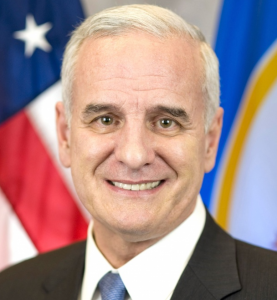By Sam Walseth, MREA Director of Legislative Action
Minnesota Governor Mark Dayton on Friday gave a preview of his budget plan at the annual Children & Youth Issues Briefing, an event put on by the Minnesota Council of Nonprofits, the United Way and others. He told the large audience gathered that his budget plan (released Tuesday) will include $600 million for children and families and specifically $372 million would be spent on education. He didn’t specify if “education” meant early childhood through higher education or K-12 only.
 More interestingly, the Governor sternly warned against infighting among people who disagree about how to improve early learning opportunities. His frustration is shared by many, yet the legislature seems poised to walk down two very different paths when it comes to expanding early learning in Minnesota.
More interestingly, the Governor sternly warned against infighting among people who disagree about how to improve early learning opportunities. His frustration is shared by many, yet the legislature seems poised to walk down two very different paths when it comes to expanding early learning in Minnesota.
Early Learning Focus
The Senate E-12 Committee on Wednesday reviewed SF 6, which would pay for schools to provide universal four-year old preschool programs. While the House hasn’t tipped its hand yet, the House Education Finance Committee took public testimony the same day, mostly from organizations pushing a scholarship only approach to building out an early learning system.
There are other proposals floating around the Capitol complex as well, namely adding some millions of dollars to the School Readiness program (MS 124D.15). That program uses school-based community education to build out early learning programs, specifically targeted at low income 3- and 4-year-olds. We’re a long way from a conclusion on early childhood education. Learn more about this issue.
MREA urges you to talk to your legislators about what you’re offering for early learning in your district and what you have capacity for. If you’re working collaboratively with other community providers on coordinating staff development and curriculum please share this with them as well.
In early December MREA assisted with getting two collaborative early learning efforts to the Senate’s witness stand; one from Grand Rapids and another from Willmar. Their testimony emphasized that Greater Minnesota communities work together, across organizations, for the betterment of their children, especially low-income kids. The Governor wants to hear this instead of the in-fighting between advocates for various silos of early education programs and exclusive revenue models. We believe rural Minnesota can help bring a healthy dose of pragmatism to this conversation.
Get the latest updates
Follow @MREAvoice on Twitter for the latest updates on the Governor’s budget plan on Tuesday. Learn what the budget means for Greater Minnesota schools during a virtual meeting hosted by MREA on Feb. 5 at 3:30 pm. Register now.

